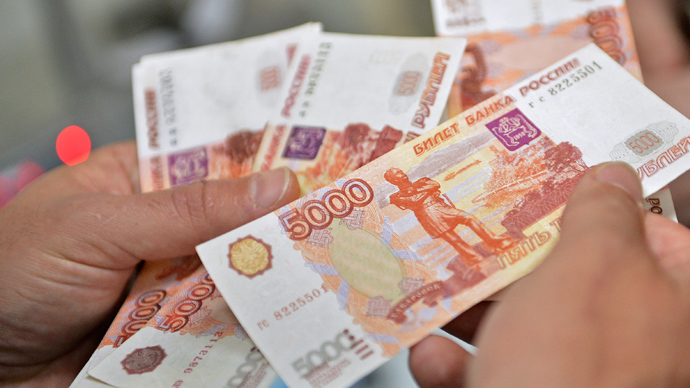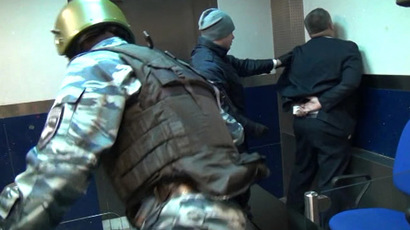Storm or ‘ripple’? Ruble hits 4-year low

Despite oil remaining above $110, the ruble has dipped to its lowest level since 2009. Experts say a lack of trust in Russian banks, hit by a wave of license withdrawals, coupled with repeated gloomy economic forecasts, has weighed on the currency.
The ruble has fallen against the world’s main currencies for three days in a row. It has fallen 4 percent against the US dollar in the past month, bringing its depreciation since the start of the year to almost 8 percent. The dollar-euro basket value reached 38.5 rubles, which is 9 percent up against the ruble over the year.
However, senior Russian policymakers played down the ruble’s fall, with Economic Development Minister Alexei Ulyukayev saying it was “entirely natural.”
A downward revision of the country’s current account surplus, coupled with the end of the monthly tax period, were among the biggest factors dragging the ruble down, Ulyukayev said.
Exporters pay major taxes at the end of each month, which means that lots of foreign currency is then converted into rubles.
“It is impossible to call this a fluctuation. I would call it … a ripple,” Finance Minister Anton Siluanov said.
“According to the Central Bank’s estimates, [the weakening] is the result of external factors,” Ksenia Yudayeva, first deputy governor of the Central Bank, told journalists.
But analysts had a different interpretation, saying the fall was due to a combination of domestic and external factors that dragged the currency.
The head of Forex BKS, Pavel Andreev, said the external factors affecting the ruble mostly included the landmark agreement with Iran that put an end to US sanctions, signifying the potential return of a large player to the oil market. The biggest domestic factor was an apparent dip in confidence in Russia’s banking system, stemming from the recent wave of license withdrawals, the analyst said to Vedomosti daily. The closure of Master Bank, a mid-size bank suspected by the Central Bank of being involved in illegal transactions, was the last straw for some, Andreev said.
"Everyone understands that another Master bank collapse will be hard to handle for the Deposit of Insurance Agency," Andreev said, referring to the state body that guarantees a certain proportion of depositors’ bank savings.
The withdrawal of Master Bank’s license meant a record $1 billion in pay-outs from the insurance agency to insured depositors.
Another possible reason is a so-called “flight to quality,” Investcafe analyst Timur Nigmatullin said. “Investors who put their money into the Russian economy see increasing risks and to minimize them they are selling ruble assets,” he said.
The Economic Development Ministry has halved its Russia growth forecast for 2013. In late 2012 it predicted 3.6 percent growth this year, but later cut this figure to 2.4 percent in April, and again, to 1.8 percent, in September.













